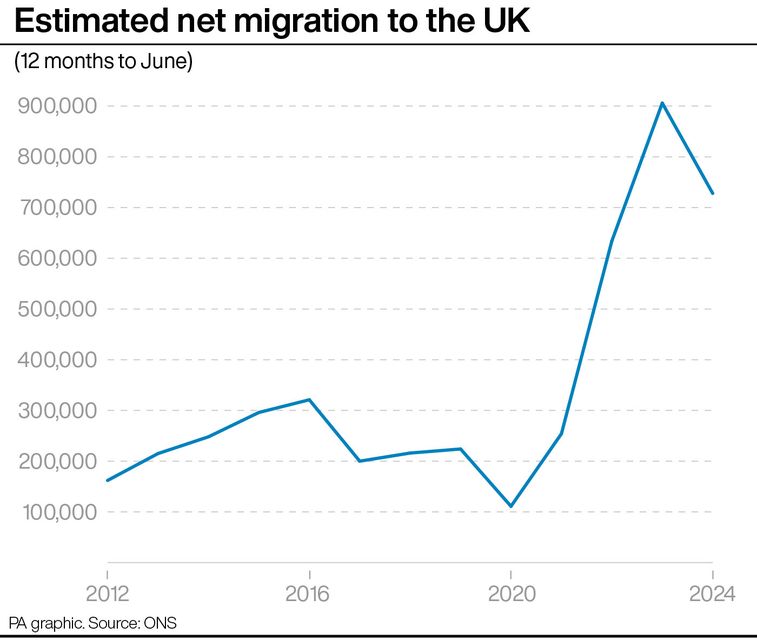Net migration could be down to around 300,000 “in the next two to three years”, according to the head of the independent body advising Government on migration.
Professor Brian Bell, the chairman of the Migration Advisory Commttee (MAC), has said that he thinks numbers will “come down quite rapidly”, and could settle at the few hundred thousand mark as an average for “the next 10-20 years”.
The difference between the number of people arriving and leaving the country hit a record 906,000 in the 12 months to June 2023, some 166,000 higher than previously thought, according to revised estimates from the Office for National Statistics (ONS).
The figures, covering the previous Conservative government’s administration before the general election, have since dropped by 20% and stood at 728,000 in the latest period for the year to June 2024.
Speaking to the PA news agency, Professor Bell said that the trend on migration figures is now “very clearly downwards” and he expects the trend to “continue and probably accelerate in the next year or two”.
He said that the body is seeing “very continuous, dramatic declines” in Home Office visa issuance numbers
He added: “It’s what we expected, and therefore I think we’ll see those numbers come down quite rapidly. And it’s always dangerous to predict that, because as soon as you say that, the numbers will get revised up again.
(PA Graphics)
“But I think […] we can be confident that we’re going to get down to the sort of levels that we think will be the long run – without any further policy changes – of about 300,000.
“I think we can get there in the next two to three years probably.”
Pressed further on how long he thinks the figures could settle in that sort of range for, Professor Bell added: “We think of 300,000 as being if you didn’t change policy anymore, that’s probably where we’ll settle.
“And you should think of that as being the average for the next 10 to 20 years.
“In the same way that in the last 10 to 20 years, it’s averaged about 200,000-250,000 – so a little bit higher than previously.”
He pointed to “geopolitical” factors as things which could influence whether those numbers come to fruition, referring to humanitarian crises and restrictions on student visas in other nations as factors which could see numbers to the UK move up or down.
“There are all those geopolitical kind of things that affect those flows in and out,” he said.
He added: “Year by year numbers of net migration are probably not a very good guide to how policy should think.
“It’s much better for policy to think about the long-run average and then ask the question, are you happy with that longrun average, and if you’re not change policy to either raise it or lower it.”
Sir Keir Starmer has repeated promises to cut immigration, but stopped short of setting any targets.
Although pledging his Government would “reduce immigration – legal and illegal”, he was unclear how this would be achieved as he set out a “plan for change” in a speech earlier this month.
Immigration did not feature in six “milestones” he set out so voters could “hold our feet to the fire”.
Under repeated questioning from reporters at the time as to why he had not included this commitment in the list, he said cutting immigration “will only be done with a serious plan”.
